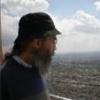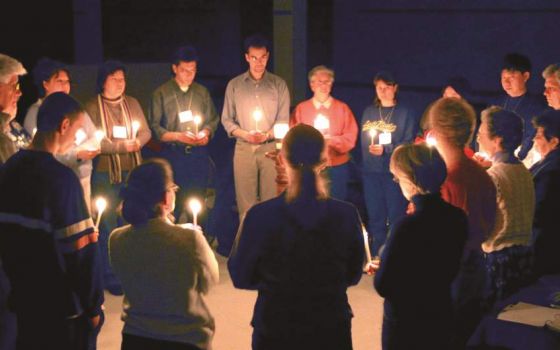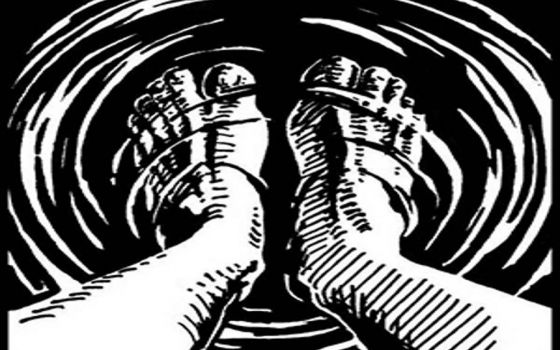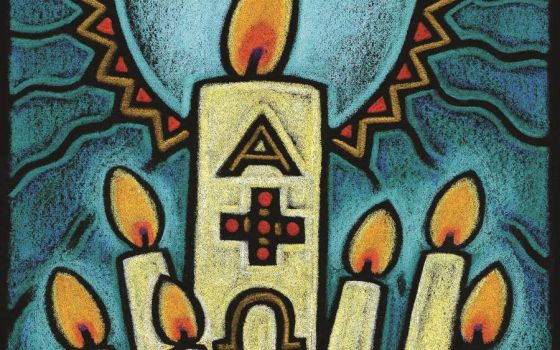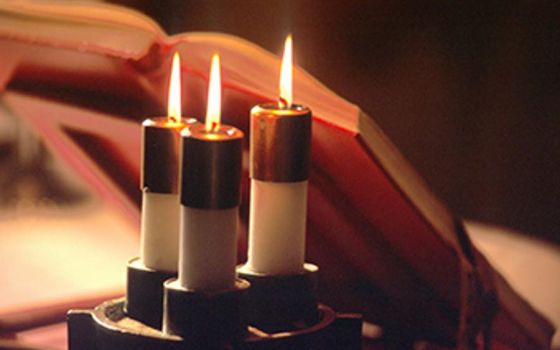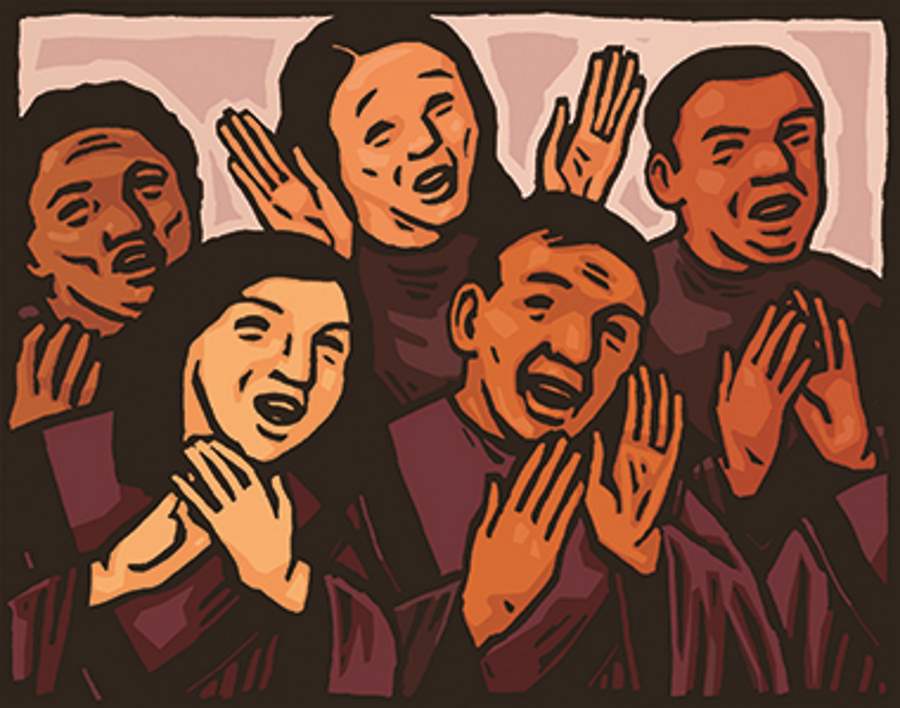
(Julie Lonneman)
To our friends in the churches in the United States:
When the people of Damascus, Christian or Muslim or otherwise, think of Holy Week, they think of marching bands. In this city, there are at least a dozen varieties of Christian communities, all of them clustered around the "Christian Quarter" of the Old City. Not all follow the same calendar, so we rarely have a year when all the churches are in Holy Week together. But still, many lines get crossed when the bands march.
Drums dominate and come in various sizes, some so large their mighty sound reminds me of other times I have experienced the power of the drum up close. Once this happened when I stood close to a circle of Native American men pounding an immense drum on the mall in Washington. The other time was quite different: I sat with my son in The Village Vanguard in New York City. We were so close to jazz drummer Elvin Jones that we could hear his breathing like that of someone engaged in a mighty physical effort. And his drums! With drums like any of these, the depth of the sound and the rhythms are less in the ear than in the blood. So it is when one of these Holy Week drums passes close on Good Friday evening.
The sound of Lent in the Christian Quarter is the sound of these bands practicing. Finally their moment comes. As the in-church part of the liturgies of Good Friday ends in the early evening, several of the churches send their bands into the narrow streets, large numbers of the assembly following, along with vested clergy, flags, some image of Christ crucified or buried. At the same time, several such parades are taking different routes through the paths that separate the walled houses of one side from the walled houses of the other. Those not walking along watch from windows and doorways and anywhere else one can avoid blocking the procession. If there could be an aerial view of these irregular paths through the homes and shops, it would show four or five processions moving slowly, sometimes nearly intersecting. And what would it sound like from above as the trumpets and drums play their dirge-like music?
These Christians are the descendants of the earliest churches. Their ancestors were here when Paul came to harass the church in Damascus but was instead blinded on the road outside this Old City. The churches of greater Syria gave shape to eucharistic practice, baptismal practice, honoring of martyrs, monastic life and, perhaps echoed in those marching bands, the pilgrimage. And these churches had fierce arguments among themselves and with the churches to the west and south and north. Perhaps, when Islam arrived here in the mid-seventh century, many Christians were worn out with the bickering among themselves. Those who remained Christian were soon a minority, but as another "people of the book" they lived peacefully with their Muslim neighbors.
Most Sundays for three years now we have joined the Chaldean community for the Eucharist. They are mostly Iraqi refugees, and they fill the church and overflow into the street outside. What is so strong is how close they come at times to what Vatican II called "that full, conscious and active participation … called for by the very nature of the liturgy." Certainly their liturgy has its overly clerical side also, but there can be no doubt that these people — who have come here from many different parishes in Baghdad, Basra, Mosul and elsewhere — know their liturgy by heart and come ready to do that liturgy. This is no less true when the average age seems to be 24 on Sunday evening than when the average age must be 30 years older on Sunday morning. Their liturgy could be imagined as a powerful recitation between presider, deacons, choir and assembly, all of it chanted (the homily excepted). The language is Aramaic, and many of them learned it as the home language in Iraq. Scriptures and preaching are in Arabic.
Which of us Americans would not be humbled in the presence of those whose lives our country has so carelessly crushed? I speak of nearly all Iraqis, including those who have found safety here in Syria. The "shock and awe" the United States unleashed in March 2003 continues to diminish one life after another. By what right have we done this? By what right do we continue? Here is a family now with a son in Sweden, a daughter in Australia, a father kidnapped and never found, a mother alone in Damascus. And here a family with a father, a doctor for 30 years, sitting day after day idle in a tiny apartment. Another family: the father somewhere in Europe hoping for work, the mother and four teenagers here trying to support themselves (jobs being off-limits for refugees but still possible if unprotected and low-paying) and knowing college educations, which they would have had free in Iraq, are now impossible. All of them are yet grateful to be safe here and all of them worry about the grandparents or the uncles and aunts in Baghdad.
Some of these Christians have with sadness turned their backs on Iraq, convinced that they can never return to find peace and safety. Others, many of the Iraqi bishops among them, are calling on Iraqi Christians to hold on and wait and plan to return and be again part of a peaceful society of Muslims and Christians who have lived together these 14 centuries.
The Sunday Eucharist and the rituals of the Triduum place us — Iraqi Christians, American Christians — in a difficult place. Side by side. How strange this is. On the American side, most of us may be on the verge of forgetting that we had this expensive war against Iraq and that we continue to occupy Iraq, just as we have forgotten how our country supported Saddam Hussein in the eight years of war with Iran, how we then turned on him and in 1991 destroyed with bombs the infrastructures that sustained life in Iraq, and how we then put Iraqis through 13 years of the most brutal sanctions, radically diminishing the lives of the ordinary people of Iraq and especially the poor. All that, we have forgotten. And other things we never knew at all: who these people are, their history, their family life, their study and their work.
Few realize that Americans are not paying much attention to Iraq these days. Some Iraqis are hoping to be resettled (the verb is always passive because they have no control over this) in the United States. And some would not go even if it were offered because they have heard the stories coming back from the "resettled": no health care, no jobs, no free colleges for their children, and very cold.
We are this April in the Triduum together, American and Iraqi Christians, side by side. And what does our American side look like? Do we continue to tame the rites, keep them churchy and efficient and disabled? The washing of the feet on Holy Thursday, for example. It seems like a moment when, entering the Triduum, we have water and soap and towels, bare feet (all of us?) and much time. We do it and we have it done to us. We watch, we wash, we are washed, we wait, we sing. It can be the people doing their liturgy, rehearsing their lives, getting straight their baptism. (It can also be something quite different, stagey or even dull, and amazingly — I have seen it done — it can be an affirmation of clerical control.)
When we slowly learn that this is how — washing feet and having our feet washed — we approach "that other baptism" of the Vigil, when we learn that as baptized people this washing of feet is how we are to do our lives, then how do war and occupation "fit"?
Advertisement
At another moment of these days we venerate the cross: kissing, bowing, embracing. For each of us, it lasts only a few seconds, but in the midst of the Triduum we are each of us alone in the midst of the assembly as we make a gesture of love and honor, some physical showing of what we hold dear. And it seems what we hold dear is this cross, the tree of paradise, the instrument of torture, the tree of life, the vine. What on earth does it mean that people in this most powerful of nations are doing something like this? What has and will become of us?
Then, in the darkness between Saturday and Sunday, we assemble for the long night’s vigil and work. When we have told again the scriptures that speak of this night from so many sides, and when we have returned the Alleluia to its place and proclaimed the Gospel, and when we have called upon all that mighty cloud of witnesses and come to the font, we should take a deep breath and hope that we are ready to renounce and to profess.
Here in Syria a person can visit the stone churches in the Dead Cities region, many of them still standing after 1,600 years. In some of them we can see the baptistery, a building apart from the church, four or five steps leading down into the water, then steps going up in the other direction. Here, before their baptism, the candidates did this renouncing and this professing.
In an article in Worship magazine (September 2007), David Batchelder wrote about the renunciations we make at the font. Even when Christian practices were only a few generations old in this Syrian land, these renunciations had become a central element in baptism. And so they remain. Not only are the candidates asked to proclaim publicly what they renounce and what they believe, but we all follow their lead and make our renunciations. Batchelder’s concern is that we so readily "develop immunity to the converting power of our rites." He asks: "How might we respond to ritual self-deception that makes it possible to affirm a form of baptismal identity we do not actually practice? What correctives might we consider that help us avoid practicing baptism as a sacramental façade, the appearance of a meaning not lived?"
That is, who wouldn’t renounce Satan? It’s easy. And without discerning and work, it’s empty. Batchelder argues that "the church has never left discerning sin to the privacy of individuals. Its practice is communal. We cannot renounce what we have not unmasked. Renunciation means naming names. Discerning idols, whether national, cultural, ecclesial, or personal, and how they work their power is absolutely necessary to renunciation. If we do not place under scrutiny our many cultural addictions, we will be unable to see their messianic pretensions for what they are. … Such new possibilities as the church might consider must become disentangled from all ideologies political and otherwise lest we mistake that which is perishable from the imperishable Gospel of Jesus Christ and the new world ushered in through his dying and rising."
These three moments — washing each other's feet, venerating the cross, the renunciations — what catechesis is there? What care for them that they might rehearse us for Christian life? What mystagogy that their mystery might be unfolded and pondered? What exhortation among ourselves to prepare for such deeds, to do them well, and to give them authority in our lives?
Such rituals, done with care and strength year after year, are, like the drums of Good Friday here in Damascus, meant to vibrate inside us, identify us to ourselves and to each other and to the world.
Editor's note: This reflection was originally published in the April 2009 issue of Celebration. Sign up to receive daily Lenten reflections.
